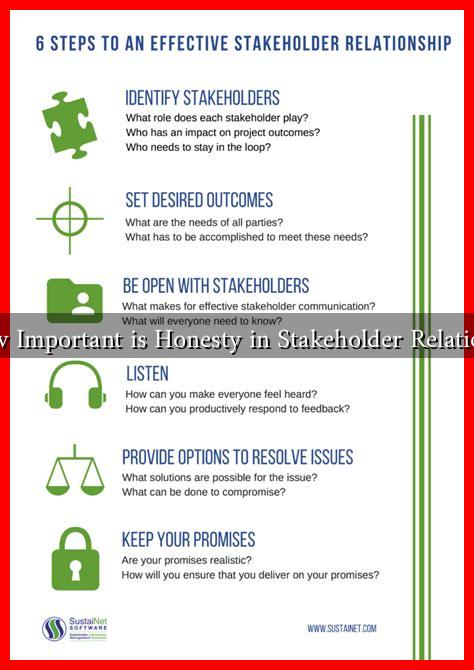-
Table of Contents
How Important is Honesty in Stakeholder Relations?
In today’s complex business environment, stakeholder relations have become a critical component of organizational success. Stakeholders, including employees, customers, investors, suppliers, and the community, play a vital role in shaping a company’s reputation and long-term viability. At the heart of these relationships lies a fundamental principle: honesty. This article explores the importance of honesty in stakeholder relations, supported by examples, case studies, and relevant statistics.
The Foundation of Trust
Honesty is the cornerstone of trust, which is essential for effective stakeholder relations. When stakeholders perceive a company as honest, they are more likely to engage positively with it. Trust fosters collaboration, loyalty, and a sense of community among stakeholders. Conversely, dishonesty can lead to skepticism, disengagement, and even reputational damage.
- Employee Engagement: Employees are more likely to be engaged and productive when they trust their leaders. A study by Gallup found that organizations with high employee engagement levels outperform their competitors by 147% in earnings per share.
- Customer Loyalty: Customers are increasingly valuing transparency. According to a survey by Label Insight, 94% of consumers are likely to be loyal to a brand that offers complete transparency.
- Investor Confidence: Investors seek companies that demonstrate integrity. A report by the CFA Institute revealed that 61% of investors consider a company’s ethical behavior as a key factor in their investment decisions.
Case Studies Highlighting the Importance of Honesty
Several case studies illustrate the critical role of honesty in stakeholder relations:
1. Johnson & Johnson: The Tylenol Crisis
In 1982, Johnson & Johnson faced a major crisis when several people died after consuming cyanide-laced Tylenol capsules. The company’s response was a textbook example of honesty in stakeholder relations. Johnson & Johnson immediately recalled 31 million bottles of Tylenol, communicated transparently with the public, and worked closely with law enforcement. This honest approach not only saved lives but also restored consumer trust, allowing Tylenol to regain its market position within a year.
2. Volkswagen: The Emissions Scandal
In stark contrast, Volkswagen’s emissions scandal serves as a cautionary tale. The company was found to have installed software to cheat emissions tests, leading to significant legal and financial repercussions. The lack of honesty in their dealings resulted in a loss of consumer trust, a plummet in stock prices, and billions in fines. This case underscores how dishonesty can have devastating effects on stakeholder relations.
Building a Culture of Honesty
To foster honesty in stakeholder relations, organizations must cultivate a culture that prioritizes transparency and ethical behavior. Here are some strategies to consider:
- Open Communication: Encourage open dialogue between management and stakeholders. Regular updates and feedback mechanisms can help build trust.
- Ethical Training: Provide training for employees on ethical decision-making and the importance of honesty in their roles.
- Accountability: Establish clear accountability measures for ethical breaches. When stakeholders see that honesty is valued and enforced, they are more likely to trust the organization.
The Long-Term Benefits of Honesty
Investing in honesty pays off in the long run. Companies that prioritize transparency and ethical behavior often experience:
- Enhanced Reputation: A strong reputation attracts customers, investors, and top talent.
- Increased Loyalty: Honest communication fosters loyalty among customers and employees alike.
- Better Risk Management: Transparent organizations are better equipped to identify and mitigate risks, leading to more sustainable growth.
Conclusion
In conclusion, honesty is not just a moral imperative; it is a strategic asset in stakeholder relations. By fostering a culture of transparency and ethical behavior, organizations can build trust, enhance their reputation, and ultimately achieve long-term success. The examples of Johnson & Johnson and Volkswagen illustrate the profound impact that honesty can have on stakeholder relationships. As businesses navigate an increasingly complex landscape, prioritizing honesty will be essential for sustainable growth and positive stakeholder engagement.
For further reading on the importance of ethics in business, you can explore resources from the Ethics & Compliance Initiative.

